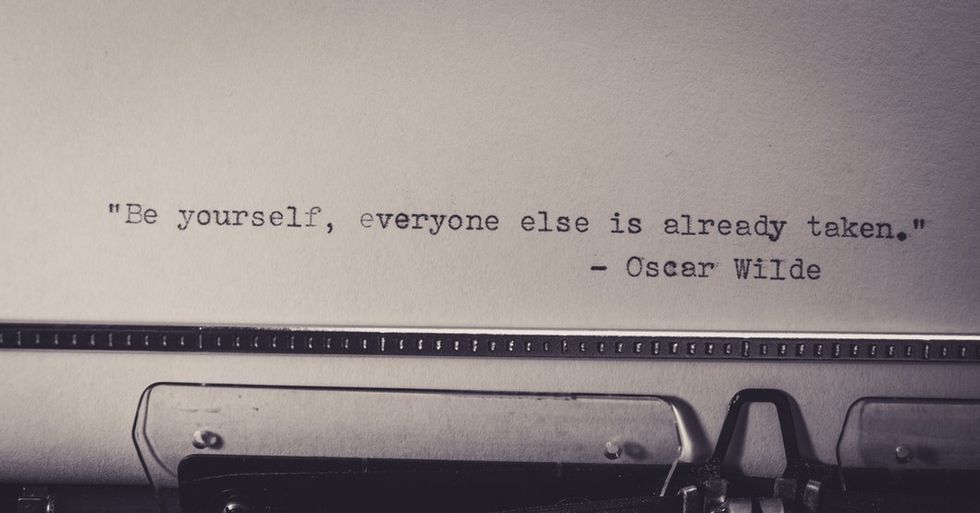One of my biggest challenges has always been getting past how I see myself, including not always recognizing what my gifts are. During my freshman introductory course, I was surprised when my advisor told me that I was a greater writer since I did not have confidence in myself as an academic and writer. She pushed my boundaries by encouraging me to write for a blog and I found myself stepping out of my comfort zone.
As I became more comfortable with putting my authentic voice in my writing, I then joined the Dayton Odyssey community as a content creator. My old fears began to resurface: Do I have anything important to say? Does anyone want to hear what I have to say? Do I even write well?
After writing for Odyssey for over a year, I have found that I have grown in my ability and confidence as a writer. This summer I even had the confidence to apply to a summer research program at UD and got a head start on my thesis. While my journey is not over, I have learned a lot about being a writer and how to be more confident in my writing.
I wanted to share what I have found helpful and advice I have been given that may help you build confidence as a writer.
1. Practice makes perfect.
If you want to master any skill or build a habit, you need to practice. A great thing about writing for The Odyssey is that every week I have to write an article and now I have written close to 50 articles! The more I have written, the more I have learned what works and found my own writing style. Set time aside whether it's every day or weekly to just write. In the words of Epictetus, "If you wish to be a writer, write."
2. Start small and set goals.
Build up your writing endurance. Don't start out trying to write a whole novel. Consider using small writing prompts to help inspire you and start small. Try setting goals at first like only writing a certain word count or for a certain amount of time and slowly increase the amount. Most importantly, also finish what you start. This is a great way to keep track of your accomplishments and can give you a sense of pride in your work.
This works for both creative writing and for writing for school. If you have a big paper or project you need to write, chunk it down and set writing goals for yourself like write a paragraph of the paper a day. You can make an outline to help you achieve this and then check off parts as you go.
3. Write what you know and what you like.
It's a lot easier and you will probably feel more comfortable when writing about something if you already know a lot about it and or have a passion for it. It will make it easier because you won't have to do as much research and won't have to worry about messing up the facts.
Odyssey encourages us to write about "How's [my] identity tied to what's going on in the world?" Try writing in a way that incorporates more of your identity or opinions to make it more authentically you. Think about where you're from, your beliefs, your political views, your hobbies and talents, what you consume or like (e.g. media and brands).
4. Get out of your head.
A professor once told me that I should never go longer than 20 minutes staring at my laptop without making some progress writing. If you're stuck, try stepping away and coming back to your work with some fresh eyes. Go for a walk or sleep on it. Don't let yourself get frustrated and don't worry about having the 'perfect' words. Just write what comes into your thoughts and edit later.
5. Always proofread and edit.
None of us are perfect. Proofreading can often be the extra step needed to make sure your paper seems professional by catching mistakes in spelling, grammar, and punctuation. Being concise and having a good flow to your writing is key. After just letting your thoughts and writing flow, go back through to make sure everything flows and take out any unnecessary parts.
In an academic paper, make sure all your points support your argument and are cohesive. Remember that the first draft should never be the final draft.
6. Don't compare, but do learn from others.
Your writing voice is your own and in the process of trying to become a better writer don't become a different person as well. If you find someone successful who has a similar tone and style as yours, don't compare but rather read their works and think of how you can apply their expertise to your own work.
7. Try different writing styles and following a writing formula.
Find what works for you and what style you feel most comfortable writing in. Although writing gives you space to be creative, there are some loose rules on structure for some genres or types of writing. Consider looking at formulas to help guide your writing, especially if you are stuck.
For academic writing, consider looking up suggested templates or example essays for suggestions on how to write in that subject or style. For example, there are outlines you can use to fill in your information and help you organize your points like this outline for a persuasive essay. Consider looking up examples of words and phrases for transitions and making points that you can incorporate into your writing style like Oxford Royale Academy's and Smart Words' lists.
8. Share your work.
This has always been the hardest part for me. I would recommend starting small. Share your work with the people you trust and respect the most, like your friends, family, and significant other. These people know you the best and care for you, so any feedback you receive will often be given in a gentle way and it's easier to remind yourself that they are telling you because they genuinely care and want what's best for you. My boyfriend is super supportive, and I used to have him proofread all of my Odyssey articles before I even submitted them for review and editing. As I grew in my confidence, I have depended on him less and tend to just submit to Odyssey itself.
If you're working on an academic paper, ask friends or classmates to read your paper. Take opportunities to meet with your professor because even if they won't read your paper you can often discuss your ideas and see if you are in the right direction. If your school offers it, take advantage of services like at the library that will sit down and help you review your work. Your paper will not only be proofread and edited, but these sessions can also help you realize tips and develop the skills needed to be able to review your paper on your own.
I hope these tips will help you to improve in your writing skills and build your confidence. As Markus Zusak wrote in The Book Thief,
"I have hated words and I have loved them, and I hope I have made them right."




 Christmas and New Year gift card
Photo by
Christmas and New Year gift card
Photo by  butter cookies on plate
Photo by
butter cookies on plate
Photo by  boy holding Holy
boy holding Holy 











